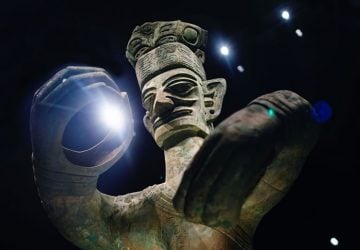Spanning millennia, ancient China's storied past has deeply influenced global history with its formidable kingdoms and timeless wisdom. Join us as we explore this exceptional culture's pivotal eras and schools of thought.

In the annals of China's storied past, the Xia Dynasty emerges as the earliest recorded lineage, setting the stage for a burgeoning civilization. Renowned figures like Emperor Yu the Great are heralded for pioneering advancements in agriculture, irrigation, and the art of bronze casting during this era.
The subsequent Shang Dynasty heralded the inception of a unified rule and the advent of script on oracle bones. This epoch experienced a flourishing of proto-Chinese script and sophisticated bronze craft. Moreover, the Shang era formulated a societal pecking order and deepened religious practices linked to ancestor veneration.
Following was the influential Zhou Dynasty, which introduced the pivotal "Mandate of Heaven" doctrine, proposing that rulers held divine sanction to govern but risked losing it through misrule. The age also birthed pivotal schools of thought such as Confucianism and Daoism, which steered the cultural ethos of the time.
During the Qin Dynasty, an era of consolidation swept the nation. Emblematic for Emperor Qin Shi Huang's reign, China not only saw unification but also saw the standardization of script, coinage, measurements, and the inception of the Great Wall. The emperor's burial site is famed for its terracotta soldiers—an astonishing archaeological find.
The Han Dynasty, often seen as a zenith in China's classical epoch, catalyzed progress across literature, arts, science, and innovation. This golden era saw the Silk Road flourish, creating a conduit between East and West. Confucianism ascended as the primary ideology, and a merit-based bureaucratic recruitment system took root.
As for the Tang Dynasty, it stands as a beacon of artistic and cultural renaissance, marked by affluence, robust trade, and global-mindedness. Chang’an, known today as Xi'an, became a hub of artistry and commerce. It was a golden age for poets and artists, with pioneers such as Li Bai and Du Fu leaving indelible marks.
Technological ingenuity and fiscal progress distinguished the Song Dynasty era. The invention of movable type printing turned the tides of knowledge sharing, while enhancements in farming and irrigation bolstered yields. This period also observed the emergence of Neo-Confucianism—a syncretism of Confucian, Buddhist, and Daoist elements.
Lastly, the Ming Dynasty epitomized a time of stability and affluence. It saw the fortification of the Great Wall and the erection of Beijing's illustrious Forbidden City. The maritime ventures of Zheng He, reaching distant shores like Africa, underscored this epoch's expansive reach.
Traversing through time, ancient China's history is a compelling narrative of dynastic power, enduring philosophy, and milestones that have molded a unique civilization. From the Xia to the Ming era, China's historical contributions in governance, technology, arts, and philosophical thought persistently echo in the modern world, enriching our understanding and reverence for this ancient culture's lasting influence on humanity.
Explore the Tranquil Bliss of Idyllic Rural Retreats

Ultimate Countdown: The 20 Very Legendary Gaming Consoles Ever!

Understanding Halpin and its Influence

Affordable Full Mouth Dental Implants Near You

Discovering Springdale Estates

Illinois Dentatrust: Comprehensive Overview

Embark on Effortless Adventures: Unveiling the Top in Adventures Made Easy Outdoor Equipment

Unveiling Ossur Valves: Innovation in Prosthetics

Unlock the Full Potential of Your RAM 1500: Master the Art of Efficient Towing!
